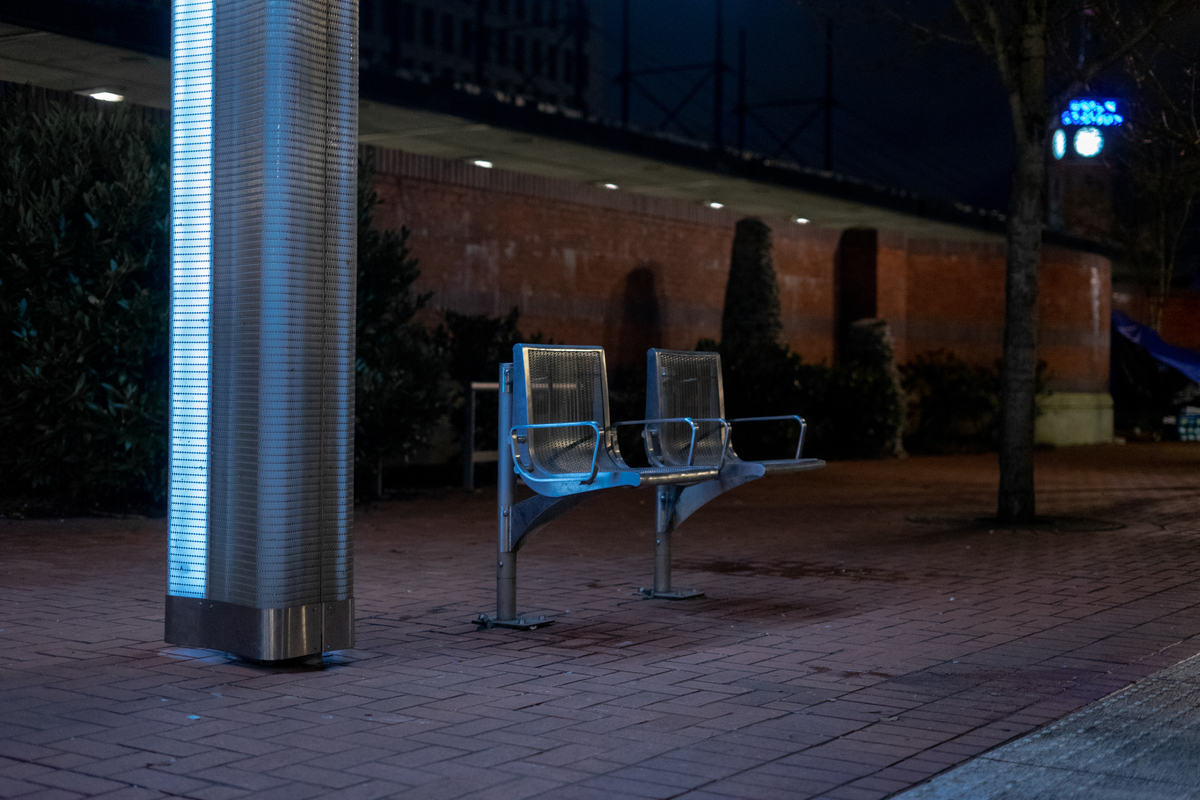Kathryn Thomsen
:Did someone mention, uh, tenure? The topic of tenure at the university is not likely to hold much interest among students when weighed against other hot and steamy discussions. What’s it to us, anyway?
Rolling around somewhere in the clutter of my brain, is a faded black and white film clip of a very old and absent-minded professor, looking down his bespectacled nose behind a huge, dusty desk. I suspect that in one of those drawers is a hidden flask with an emergency beverage. Somehow, I held a concept of tenure in connection with this old codger. I thought that it was a professor’s life sentence in a university.
Luckily, I have not encountered such a moldy representation of a professor at Portland State University. From my first day here, the outdated image dissolved and a new one emerged. Although the new portrait is entirely different, it is no less alarming. It is one of a modern breed of professors, stripped to a bare-bones budget, clinging to a shimmering mirage in an academic desert.
On several occasions now, in classrooms on the opposite ends of campus, the issue of tenure has slipped out and with it, some hidden truths. Tenured positions are highly sought in universities not for mere job security, but for the academic freedom they provide. The right to give an unpopular opinion, which may go against the ordinary mass mentality, is an unwritten guarantee of having tenure.
The perks are a one-year paid sabbatical every seven years, research money (to further the professor’s area of specialization) and job security. All this provides an atmosphere of support and continued professional development for the professors. For the students, tenure translates into a higher quality of education, one with breadth and depth of knowledge.
Yet there is a hitch to this glorious pursuit of academic excellence. At PSU, there is only a limited number of tenure-track positions. The process from new-hire to tenure (of which only about 50 percent succeed) is grueling. It is six to seven years of teaching, yearly reviews and close scrutiny. The hopefuls must produce a minimum of seven publications. Without satisfactory results, it is goodbye job or hello year-to-year contract teaching.
In fact, most of our teachers are simply hired on a yearly contract, with little hope of moving into a tenure-track position. Julie Schmid, who is the chapter coordinator for the American Association of University Professors, unravels some of the hush-hush at PSU. Yearly contract teachers are called “fixed-term staff” and these positions are increasing, while tenure positions are slowly eroding.
The erosion of tenure at our university is a cost saving measure. The university wants to maintain financial flexibility. Fixed-term faculty salaries are lower and offer no perks aside from health benefits. Although fixed-term faculty is also eligible for sabbaticals, the catch is that there is no guarantee of being around from one year to the next.
The problem lies in the reality that the fixed-term faculty have no job continuity (hence no job security). Developing a quality curriculum with creativity and depth becomes secondary to survival. Enriching the course by blazing new trails and uncovering a fountain of knowledge takes a back seat while professors spend their time self-censoring in the hopes of renewing their contracts. With a short-term contract, it is easier to dismiss a faculty member for not being in line with the ideals of the administration.
Fortunately we have some extraordinary non-tenured teachers at PSU. Yet there isn’t a course at the university, which doesn’t preach some aspect of Maslow’s hierarchy of needs. How can teachers operate at optimal levels when they are worrying about keeping their jobs? How can they meet the goals of quality education – by addressing the higher needs at the top of the pyramid – when they are scrambling at the base for academic survival?
Schmid reports that in the latest round of teacher negotiations (which lasted seven months) some concessions for longer-term contracts (up to a whopping two years) were reached. Small pay raises resulted, but the problem of eroding tenure remains unresolved. AAUP assigned a task force to research how best to address the issue in future negotiations.
Although the university has to meet standards of accreditation by having a certain percentage of tenure positions, PSU may be walking a fine line. Tenured positions are budget busters and therefore unpopular. When balancing the budget, there is a tendency to skimp on quality.
After interviewing a couple of professors (who wish to remain anonymous), I was reminded that tenured faculty are an enormous resource. The process of developing this human resource, which takes foresight and long-term planning, is being compromised at PSU.
Providing an idealistic education is easily within the realm of our teaching faculty, but only in an atmosphere of support and respect for tenure. Phrases that describe the “anchor of tenure” as a “great reservoir of knowledge” and the “last vestige of truth” easily slip out of the mouths of my professors. In their eyes, I can see that the student comes first. They are here to send illuminating sparks of alternate realities into our impressionable minds.


